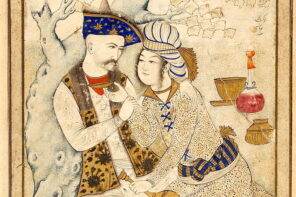The fasting month runs for 29 or 30 days, depending upon the sighting of the moon. This moon sighting thing has become more of a bone of contention in modernity so I will weigh in on the theme as well.
In times before clocks we really depended upon the moon to tell us where we were along the month. This Islamic month begins with the new moon, but there is a time when the moon disappears so everything used to be based upon the actual sighting of the new moon.
As you can imagine for important things, like the sacred months—especially the end of fasting and the beginning of celebration—this was a much anticipated occurrence. So much emphasized in fact, that the universally recognized “symbol” for Islam is the star and the crescent. Shortly after sunset on about the third day of Ramadan there is the perfect version of that which we now recognize from flags and other stuff.
Just as the marking of time by the moon is somewhat obsolete, since we can’t get our full solar year out of it, some of the advances in technology have made it obsolete just to wait on the human error of actually “sighting” the moon. And so it has been debated, do we actually need this moon sighting to begin the fasting month? We already know when the new moon will be, so why wait; especially when it is not visible to the human eye sometimes. We could canonize the “new moon” at its time and start fasting universally and do away with the discrepancies that occur some where each year.
I want to weigh in on the more primitive side of waiting for local sighting and announcement. There is something about the simple act of returning to nature that appeals to me romantically. That we can never seem to agree once and for all that it should be by the calendar or by the human sighting is a good reminder that we cannot perfect everything. We are subject to nature’s majesty and awe, and we are in surrender to Allah in all things, the moon sighting being just one. Sometimes and we are subject to the assertions of our communities.
I don’t know why, but I like the quibbles, it makes us seem all the more human and invokes in me a kind of humility towards myself and a compassion towards others.
Perhaps it is because my rule is not one of collective responsibility. I begin my fast according to the locality in which I live. If they follow the calendar and start fasting on a certain day then I will start on that day. If I am in a locale that starts fasting according only to the actual sighting of the moon then I will start my fast when they determine it is time. I do this not because I lack political will or even because I lack an opinion, as I said; I prefer the citation of the hilal (crescent) over the calendar method.
I do this because the end of the month of fasting will be determined by the same method. I do not want to be fasting while every one is celebrating because I am following some hard fast rule that I cannot control in my own locality. Nor do I want to complete the 30 days according to one method of determination and then find that every one else in my locale are still fasting for one additional day so I cannot fast (that is the rule, past 30 days the fast is complete) but I cannot celebrate, either.
Those who are not ABLE to fast are not required to fast, older people, children, people with any medical condition that requires attention, regular medications, or just sustaining your blood sugar levels like with diabetes. Women do not fast during menstruation, pregnancies, or just after child birth and through out the full time nursing of babies, or according to their own discretion. Interestingly enough the jurists (fuqaha) determined that the days missed for menstruation must be made up before the next fasting year.
Any temporary condition that is an exemption must be made up at some other point. This is true for women and men. It’s just that women have these periods regularly. If I were a jurist I would have made a different ruling: would not require women to make up those monthly days of exemptions. It is not arbitrary, so let me say something about my reasoning.
For starters, the relevant Qur’anic passage says,
“Oh you who believe, fasting is prescribed for you, as it was prescribe for those who preceded you,—that you might achieve taqwa,—for a fixed number of days. Then whoever of you is sick or on a journey, there is then the counting out of other days (to make up the fast). And those who become strained by it, there is the redemption of feeding a poor person. But whoever does good spontaneously it is better for him, and if you observe the fast, it would better for you, if you only knew.” 2:183-4.
To equate menstruation with sickness is not confirmed by the Qur’anic consideration or the ahadith. It was never considered a sickness although blood in any form, even if from a dental distraction, requires the performance of ritual purification before proceeding to worship. So menstrual blood is the same; a flow of blood, requiring purification afterwards to proceed back to ritual worship, but not some tainted thing and not some kind of sin or even sickness.
Sometimes this equation, blood equals ritual purificatio,n gets twisted into the idea that menstruation is sick or dirty. We really have to examine some of the underlying results of this twisted thinking. That which is the only biological symbol of women’s fertility that is the means where by all human life flows, has been tainted and made into a thing unpure. This message is internalized and the simple logical consistency between blood and purification is askew. None of those who were wounded in battles at the time of the Prophet were condemned to this blood equals impure association, but women get tainted for decades of their lives.
In my life time as an observant Muslim woman, I gave birth to and nursed five children. I was also pregnant but unsuccessful with delivery. I sometimes fasted while pregnant and sometimes while nursing because I made my own judgment on my capacity to do so. Those years when I could not fast, or those days when still menstruating when I could not fast were inevitably rolled into other days of menstruation, pregnancies, or nursing.
Why is the double duty of women’s schedule not taken into consideration for reprieve? If we miss a day because of these biological aspects, like menstruation, I’m not sure this hard and fast ruling takes any consideration of just how reasonable or unreasonable it would be to remake those days.
I think the exclusively male jurists were jealous women were given this vacation and so took it back by requiring us to fast on other days, as if we had done this to ourselves on purpose to miss a few days fast each month.
And Allah knows best.




